Frederick Douglass Moorefield Jr., a former senior member of the Department of Defense communications staff, has been arrested and charged with participating in a dogfighting ring for over 20 years. Moorefield, along with a longtime friend, Mario D. Flythe, allegedly trained dogs for fights, ran bets on the outcomes, and executed dogs that did not die during matches. Investigators discovered evidence such as battery jumper cables used to execute dogs, pit bull-type dogs at both Moorefield and Flythe’s houses, weighted collars and heavy metal chains, and an apparatus for involuntarily inseminating female dogs. The two men communicated about dogfighting through an encrypted messaging app called Telegram, using code names for their operations. They discussed training dogs for fights, exchanging videos, arranging fights and wagers, and methods of killing losing dogs. Moorefield had been involved in dogfighting since at least 2002, and evidence of his involvement was found periodically over the years. The authorities have been investigating the dogfighting ring, known as “the DMV Board,” for years, and other members have been indicted and pleaded guilty. Moorefield and Flythe face charges of promoting and furthering animal fighting ventures, and if convicted, they could face up to five years in federal prison. The Department of Defense confirmed that Moorefield is no longer working at the Pentagon, but did not provide further details on his employment status. Animal rights advocacy groups have expressed concern about the prevalence of animal fighting and the need for more enforcement.

Key Takeaways:
- Frederick Douglass Moorefield Jr., a former senior member of the Department of Defense communications staff, has been arrested for participating in a dogfighting ring for over 20 years.
- He allegedly trained dogs for fights, ran bets on the outcomes, and executed dogs that did not die during matches.
- Investigators found evidence such as battery jumper cables, pit bull-type dogs, weighted collars and chains, and an apparatus for involuntarily inseminating female dogs.
- Moorefield communicated about dogfighting through an encrypted messaging app, discussing training dogs, arranging fights, and methods of killing losing dogs.
- If convicted, Moorefield and his friend could face up to five years in federal prison, and animal rights advocacy groups are calling for stronger enforcement against animal fighting.
Before his arrest, Frederick Douglass Moorefield Jr. had a career in the Department of Defense, working as a senior member of the communications staff. However, his involvement in dogfighting has cast a dark shadow over his professional reputation. Moorefield now faces charges related to his alleged participation in this cruel and illegal activity.
Moorefield’s alleged involvement in dogfighting spans over 20 years, and he is accused of training dogs for fights, running bets on the outcomes, and even executing dogs that did not die during matches. Alongside his longtime friend, Mario D. Flythe, they operated within a dogfighting ring known as “the DMV Board.”
Investigators uncovered compelling evidence that further implicated Moorefield in this illicit trade. Battery jumper cables, used to execute dogs, were discovered, as well as pit bull-type dogs at both Moorefield and Flythe’s residences. Other disturbing findings included weighted collars and heavy metal chains, along with an apparatus for involuntarily inseminating female dogs.
Communication between Moorefield and Flythe revealed the extent of their involvement in dogfighting activities. They relied on an encrypted messaging app called Telegram, using coded language and aliases to discuss their operations. Their discussions included topics such as training dogs for fights, sharing videos, arranging fights and wagers, and methods of killing losing dogs.

This case serves as a reminder of the prevalence of animal fighting and the need for stronger enforcement. Animal rights advocacy groups have expressed concern over the welfare of the animals involved and have called for increased efforts to combat this form of animal cruelty. The authorities have been investigating the “DMV Board” dogfighting ring for years, and other members have already been indicted and pleaded guilty. If convicted, Moorefield and Flythe could face up to five years in federal prison.
Unveiling “The DMV Board” Dogfighting Ring
“The DMV Board” is the name of the dogfighting ring in which Frederick Douglass Moorefield and Mario D. Flythe are alleged to have participated for over 20 years, engaging in illegal activities and causing harm to animals. This underground operation involved the breeding, training, and ruthlessly pitting of pit bull-type dogs against each other in brutal fights for entertainment and financial gain.
Investigations into “The DMV Board” have revealed the grim reality of this illicit world. Evidence collected by law enforcement includes battery jumper cables, used to execute dogs that did not die during matches, and weighted collars and heavy metal chains that were employed to increase the strength and aggressiveness of the dogs. The discovery of an apparatus for involuntarily inseminating female dogs further exposed the extent of cruelty inflicted upon these innocent animals.
The shocking extent of Frederick Douglass Moorefield’s involvement in dogfighting dates back to at least 2002, with evidence periodically surfacing throughout the years. Moorefield and his accomplice, Mario D. Flythe, communicated their despicable activities through the encrypted messaging app Telegram, using code names to conceal their operations. Messages exchanged between them discussed training dogs for fights, arranging matches, and even the merciless killing of losing dogs.
| Illegal Dogfighting Activities of “The DMV Board” |
|---|
| Training and Fighting |
| Frederick Douglass Moorefield and Mario D. Flythe allegedly trained pit bull-type dogs for fights, conditioning them to display aggression and fighting instincts. |
| Betting and Wagering |
| Participants in the dogfighting ring would place bets on the outcomes of the matches, contributing to the illicit financial gains from these cruel activities. |
| Inhumane Practices |
| The ring members were involved in barbaric practices such as executing dogs that did not die during fights, using battery jumper cables, and subjecting female dogs to involuntary insemination. |
These revelations have prompted widespread concern from animal rights advocacy groups, highlighting the urgent need for stronger enforcement against animal cruelty. Organizations dedicated to the welfare of animals emphasize the significance of raising awareness and supporting initiatives that work towards ending illegal activities like dogfighting. The fight against animal cruelty depends on the collective efforts of law enforcement, legislation, education, and the support of compassionate individuals who refuse to turn a blind eye to the suffering of innocent creatures.

Quote:
“Dogfighting is a brutal and exploitative activity that inflicts unbearable suffering on innocent animals. It is our duty as a society to stand against such cruelty and work towards its eradication.”
– Animal Rights Advocate
Evidence of Dogfighting Activities
Investigators uncovered compelling evidence of Frederick Douglass Moorefield’s involvement in dogfighting, including the presence of battery jumper cables, weighted collars, and tools for breeding dogs without consent. These disturbing findings provide further insight into the cruel and illegal activities carried out by Moorefield and his accomplice, Mario D. Flythe.
According to reports, battery jumper cables were discovered at the scene, suggesting that they were used to execute dogs that did not die during fights. This gruesome method of dispatching animals highlights the extent of the brutality associated with underground dogfighting rings. Additionally, the presence of weighted collars and heavy metal chains further supports the allegations of Moorefield’s involvement in training dogs for fights and ensuring they inflict maximum damage on their opponents.
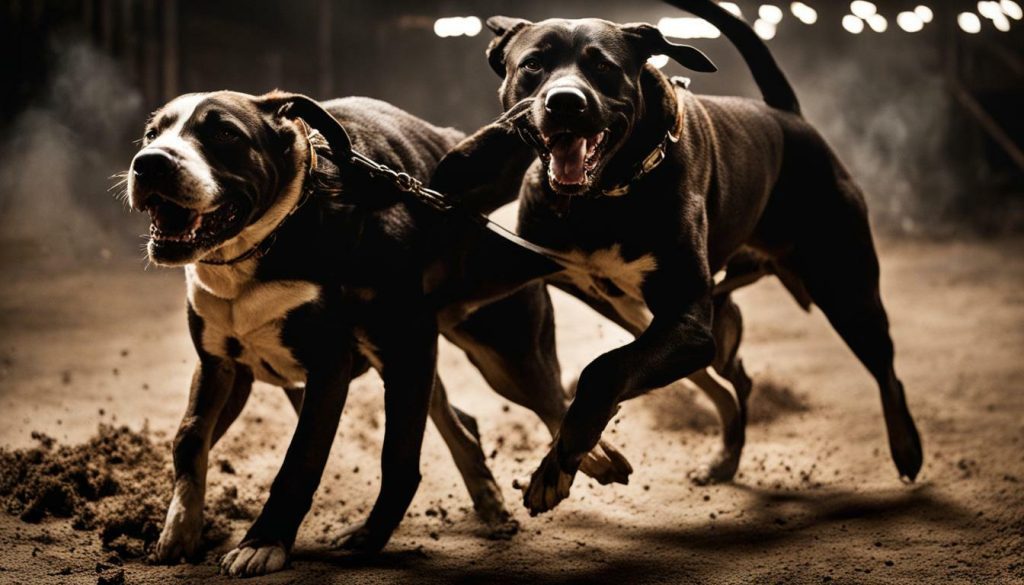
These findings not only expose the inhumane treatment of animals but also shed light on the lengths individuals are willing to go to for their own entertainment and financial gain. It is a stark reminder of the ongoing battle against illegal dogfighting and the urgent need for stronger enforcement and education to protect the welfare of innocent animals.
Moreover, investigators discovered an apparatus for involuntarily inseminating female dogs, indicating a disturbing level of control exercised over these animals. This revelation adds yet another layer of cruelty to the already horrific practices associated with dogfighting.
The use of an encrypted messaging app, Telegram, for communication between Moorefield and Flythe further demonstrates the organized nature of their dogfighting activities. By employing coded language and exchanging videos and information related to training dogs and arranging fights, the two individuals were able to evade detection for an extended period.
Communication through Encrypted Messaging App
Frederick Douglass Moorefield and Mario D. Flythe used the encrypted messaging app Telegram to communicate about their dogfighting operations, using coded language and sharing videos and details about training dogs and arranging fights. The use of an encrypted messaging app allowed them to discuss their illegal activities without fear of detection by law enforcement. The exchange of videos and information related to training dogs and arranging fights played a crucial role in their dogfighting operation.
Using Telegram, Moorefield and Flythe communicated under code names to conceal their true identities and the nature of their discussions. This added an extra layer of secrecy to their conversations, making it difficult for authorities to intercept and decipher their messages. The coded language used by the two men allowed them to discuss sensitive topics related to dogfighting without explicitly stating their intentions.
“We need to get those puppies ready for the big show next week,” Moorefield wrote in one of his encrypted messages, which investigators later decrypted. “Make sure to bring the supplies and gear to the meetup spot.”
The use of encrypted messaging apps for illegal activities poses a significant challenge for law enforcement agencies, as it hinders their ability to monitor and disrupt criminal operations. Encrypted messaging apps provide a secure platform for criminals to communicate and coordinate their activities, making it harder for authorities to gather evidence and build cases against them.

| App Name | Features |
|---|---|
| Telegram | End-to-end encryption, self-destructing messages, cloud-based storage |
| Signal | End-to-end encryption, disappearing messages, voice and video calls |
| End-to-end encryption, group messaging, file sharing | |
| Threema | End-to-end encryption, anonymous messaging, voice calls |
List 1: Methods Used by Dogfighters
- Training dogs for fights
- Running bets on the outcomes of dogfights
- Using weighted collars and heavy metal chains to strengthen dogs
- Executing dogs that did not die during matches
- Involuntarily inseminating female dogs to produce offspring for future fights
Investigation and Periodic Discoveries
Authorities have been investigating the dogfighting ring involving Frederick Douglass Moorefield and others for years, with periodic discoveries of evidence confirming his involvement in dogfighting activities as far back as 2002. The ongoing investigation has revealed a disturbing history of animal cruelty and illegal activities that Moorefield and his accomplices have allegedly been engaged in.
Over the years, investigators have uncovered various pieces of evidence that link Moorefield to dogfighting operations. From battery jumper cables used to execute dogs to pit bull-type dogs found at his residence, the findings paint a grim picture of the extent of his involvement. Weighted collars and heavy metal chains, along with an apparatus for involuntarily inseminating female dogs, further indicate the systematic cruelty inflicted upon the animals.
The communication between Moorefield and his partner, Mario D. Flythe, through the encrypted messaging app Telegram has provided crucial insights into their dogfighting activities. It was discovered that they used code names to discuss training dogs, arranging fights, and exchanging videos related to their illegal ventures. Shockingly, their conversations also revealed explicit discussions on methods to kill losing dogs, further highlighting the callousness of their actions.
| Discoveries | Evidence |
|---|---|
| Battery jumper cables | Used to execute dogs |
| Pit bull-type dogs | Found at Moorefield’s residence |
| Weighted collars and heavy metal chains | Used to restrain and control dogs |
| Apparatus for involuntarily inseminating female dogs | Indicating forced breeding for fighting purposes |
The discoveries made during the investigation have opposed a grim reality, shedding light on the disturbing world of illegal dogfighting. The evidence has been crucial in building a solid case against Moorefield and others involved in the dogfighting ring known as “the DMV Board.” As the legal proceedings unfold, the authorities aim to bring justice for the innocent animals subjected to such cruelty and ensure that those responsible are held accountable for their actions.
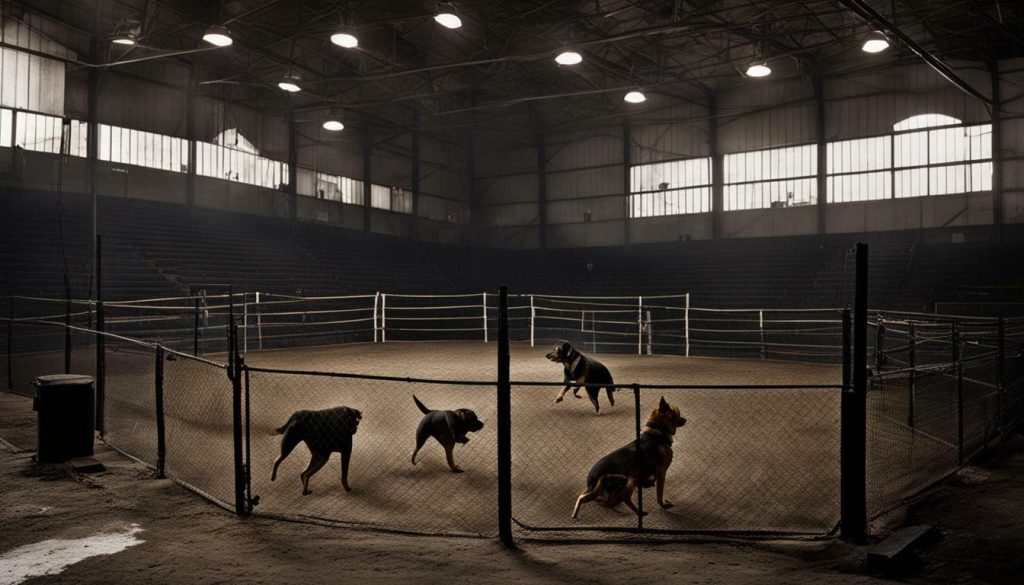
Legal Consequences and Charges
Frederick Douglass Moorefield and Mario D. Flythe face charges related to promoting and furthering animal fighting ventures, with the potential consequence of up to five years in federal prison if found guilty. Both men have been arrested in connection with a long-standing dogfighting ring known as “the DMV Board.”
The authorities have uncovered evidence that implicates Moorefield and Flythe in the training of dogs for fights, organizing bets on the outcomes, and even executing dogs that did not die during matches. Investigators found disturbing items such as battery jumper cables used to carry out the executions, pit bull-type dogs at their respective residences, weighted collars and heavy metal chains, and an apparatus for involuntarily inseminating female dogs.
The duo communicated their illegal activities through an encrypted messaging app called Telegram, using code names to conceal their dogfighting operations. They exchanged videos, discussed training techniques, arranged fights and wagers, and even shared methods of killing dogs that lost in combat.
| Charges | Potential Consequence |
|---|---|
| Promoting and furthering animal fighting ventures | Up to five years in federal prison |
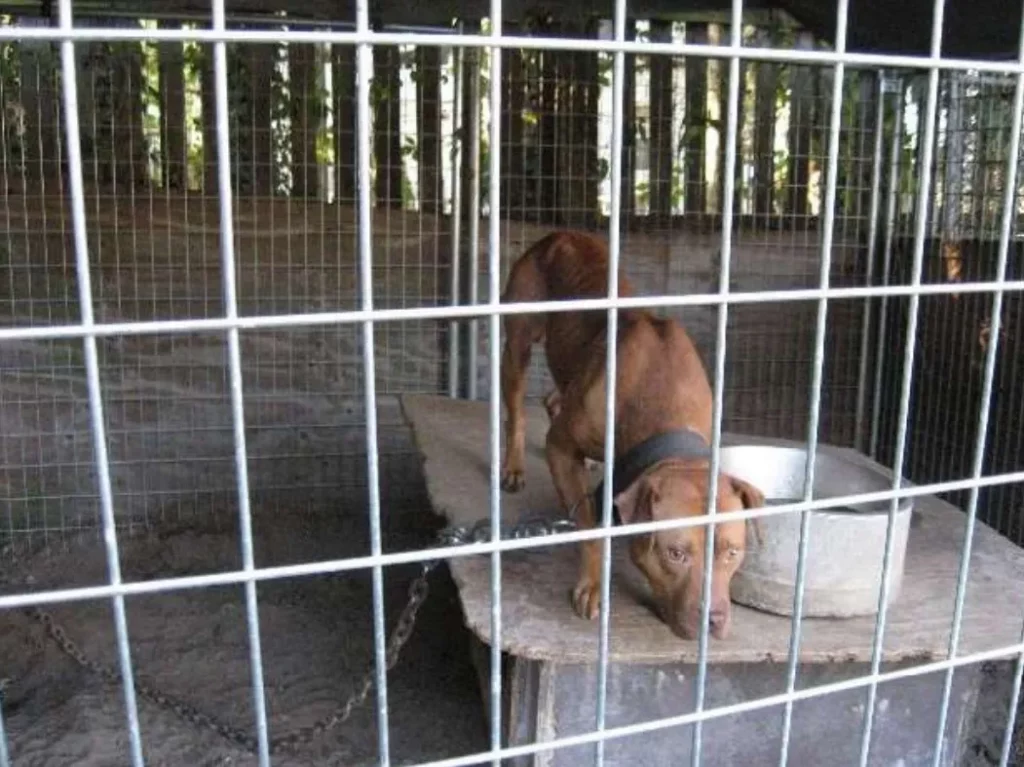
Moorefield’s involvement in dogfighting dates back to at least 2002, and evidence of his participation has been periodically discovered over the years. Law enforcement agencies have been investigating the “the DMV Board” dogfighting ring for a considerable length of time, resulting in the indictment and subsequent guilty pleas of other members.
The Department of Defense confirmed that Moorefield is no longer employed at the Pentagon but did not provide further details regarding his employment status. This case has raised concerns among animal rights advocacy groups, highlighting the need for increased enforcement measures to combat the prevalence of animal fighting and protect animal welfare.
Employment Status at the Department of Defense
The Department of Defense confirmed that Frederick Douglass Moorefield is no longer employed at the Pentagon, although specific details about his employment status were not disclosed. Moorefield, a former senior member of the Department of Defense communications staff, recently made headlines when he was arrested and charged with participating in a dogfighting ring that had been operating for over two decades.
As the investigation into Moorefield’s alleged involvement in the dogfighting ring continues, questions arose regarding his employment status at the Department of Defense. While the exact circumstances of his departure remain undisclosed, it is clear that the department has distanced itself from Moorefield. This news comes as a shock, given his previous senior position within the communications staff.
Amidst the ongoing investigation, it is imperative for the Department of Defense to maintain transparency and uphold its commitment to integrity. The involvement of an employee, especially one in a senior position, in such illegal activities raises concerns about the vetting and monitoring processes within the organization.

However, it is important to note that Moorefield’s alleged criminal activities should not overshadow the dedicated work carried out by the majority of employees at the Department of Defense. This case should serve as a reminder of the importance of upholding ethical standards, promoting a culture of accountability, and ensuring that individuals representing the organization align with its values.
| Key Takeaways |
|---|
| • Frederick Douglass Moorefield is no longer employed at the Department of Defense, and specific details about his employment status have not been disclosed. |
| • The Department of Defense must prioritize transparency and uphold its commitment to integrity in light of the allegations against Moorefield. |
| • The case highlights the importance of vetting and monitoring processes within the organization to prevent illegal activities among employees. |
| • The majority of employees at the Department of Defense are dedicated professionals who should not be overshadowed by the actions of a few individuals. |
Concerns of Animal Rights Advocacy Groups
Animal rights advocacy groups have expressed deep concerns about the prevalence of animal fighting, including dogfighting, and emphasize the importance of stronger enforcement and support for organizations fighting against animal cruelty. The case involving Frederick Douglass Moorefield Jr. and Mario D. Flythe, which uncovered their extensive involvement in a dogfighting ring, highlights the urgent need for action to combat these illegal activities.
Throughout the years, animal fighting rings have continued to operate, inflicting unnecessary suffering and harm on innocent animals. The disturbing evidence found by investigators in this case, such as the use of battery jumper cables to execute dogs and the involuntarily inseminating of female dogs, sheds light on the extreme cruelty involved in these operations. It is crucial to recognize that dogfighting is not only a brutal form of animal abuse but also a gateway to other criminal activities, including illegal gambling and drug trafficking.
To address these concerns and combat animal cruelty effectively, animal rights advocacy groups are calling for increased enforcement efforts. This includes providing law enforcement agencies with the necessary resources to investigate and dismantle dogfighting rings, as well as implementing stricter penalties for those involved. Additionally, supporting organizations dedicated to animal welfare and rehabilitation is crucial in providing care and a safe haven for the animals rescued from these operations.
By raising public awareness about the prevalence and consequences of animal fighting, these advocacy groups aim to mobilize communities to take a stand against such cruel practices. Education is a powerful tool in preventing future incidents, particularly among at-risk populations who may be susceptible to engaging in or supporting dogfighting. It is essential to teach empathy and compassion for animals from a young age, instilling values of kindness and responsibility towards all living beings.
Impact of Animal Rights Advocacy
Animal rights advocacy groups have made significant strides in raising awareness about the prevalence of animal fighting and the need for stronger enforcement. Their efforts have sparked public outrage, mobilized communities, and prompted lawmakers to take action. However, the fight against animal cruelty is far from over. It requires the continued commitment and collaboration of individuals, communities, and government entities to ensure the welfare and protection of animals.
| Advocacy | Actions |
|---|---|
| 1 | Develop and promote animal welfare legislation to strengthen protections against animal fighting |
| 2 | Collaborate with law enforcement agencies to enhance training and resources for investigating and prosecuting animal fighting cases |
| 3 | Promote educational programs in schools and communities to raise awareness about animal cruelty and encourage empathy and compassion towards animals |
| 4 | Support organizations dedicated to rescuing and rehabilitating animals involved in fighting operations |
“Our mission is to put an end to the suffering inflicted upon animals through illegal dogfighting and other forms of cruelty. We urge authorities to take swift and decisive action in prosecuting offenders and implementing stronger measures to protect animals from harm. Together, we can make a difference in the lives of these innocent creatures.” – Animal Rights Advocacy Group
With continued efforts, enforcement, and public support, there is hope for a future where animal cruelty is eradicated, and animals are treated with the compassion and respect they deserve.
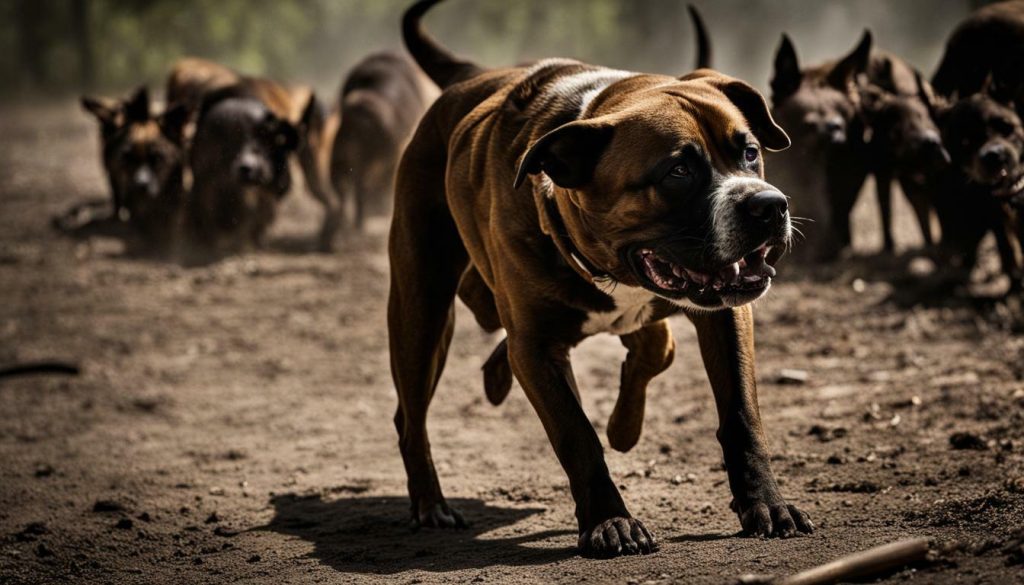
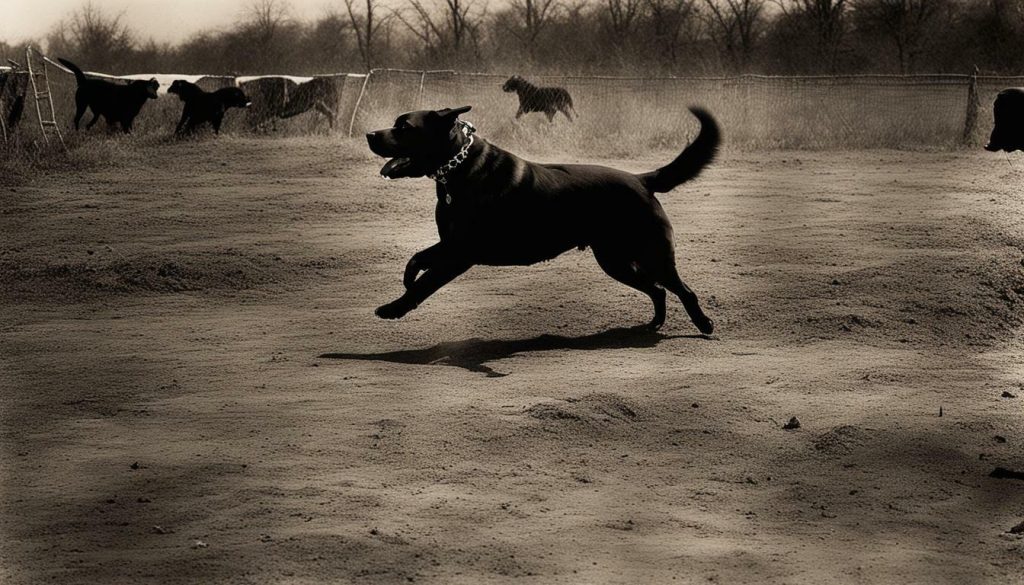

| Organization | Mission | Contact Information |
|---|---|---|
| Humane Society of the United States | To create a more humane society by advocating for animal welfare | Website: www.humanesociety.org Phone: 1-866-720-2676 |
| ASPCA | To prevent cruelty to animals through education, enforcement, and advocacy | Website: www.aspca.org Email: [email protected] |
| Animal Legal Defense Fund | To protect the lives and advance the interests of animals through legal action | Website: www.aldf.org Phone: 707-795-2533 |
Together, we can make a difference in the fight against animal cruelty. By supporting organizations, raising awareness, and demanding stronger enforcement, we can ensure that cases like Frederick Douglass Moorefield’s become the turning point in eradicating illegal dogfighting and creating a more compassionate society for all creatures.
Public Outrage and Support for Animal Welfare
Incidents of animal cruelty, such as illegal dogfighting, often provoke strong public outrage and mobilize support for animal welfare, encouraging individuals to actively contribute to the cause. The shocking details of Frederick Douglass Moorefield Jr.’s involvement in a dogfighting ring have sparked widespread condemnation and a renewed determination to combat animal cruelty.
Animal rights advocacy groups have been at the forefront of raising awareness about the prevalence of dogfighting and its devastating impact on animals. Organizations such as the Humane Society of the United States, the American Society for the Prevention of Cruelty to Animals (ASPCA), and local animal shelters have been instrumental in advocating for stronger enforcement and stricter penalties for those involved in animal fighting.

Through public campaigns, media coverage, and grassroots efforts, these organizations educate the public about the cruel and inhumane nature of dogfighting. They provide resources for reporting animal cruelty, support legislation to strengthen animal welfare laws, and offer assistance to law enforcement agencies in their efforts to investigate and prosecute individuals involved in illegal dogfighting activities.
Supporting Animal Welfare
Individuals outraged by instances of animal cruelty can take action by supporting these organizations and getting involved in their local communities. By volunteering at animal shelters, fostering animals, or donating to animal welfare causes, individuals can make a tangible difference in the lives of animals affected by dogfighting and other forms of abuse.
Furthermore, speaking out against animal cruelty on social media platforms, engaging in online discussions, and sharing educational resources helps raise awareness and encourages others to join the fight against illegal dogfighting. By working together, society can ensure that animals are protected from harm and that those who perpetrate violence against them are held accountable for their actions.
The Fight Against Animal Cruelty: Enhancing Enforcement and Education
Strengthening enforcement and education efforts is crucial in the ongoing battle against animal cruelty and illegal dogfighting, requiring robust legislation, dedicated law enforcement, and comprehensive education initiatives. To combat these heinous activities, it is essential to implement stronger laws that specifically address animal fighting and increase penalties for offenders.
Law enforcement agencies must be equipped with the necessary resources and expertise to effectively investigate, infiltrate, and dismantle dogfighting rings. Task forces dedicated to tackling animal cruelty should be established to focus on intelligence gathering, surveillance, and prosecution while working in collaboration with local communities and animal welfare organizations.
Education plays a pivotal role in preventing animal cruelty and fostering a society that values and respects all living beings. Comprehensive educational programs should be developed and implemented at various levels, targeting schools, community centers, and social platforms. These programs should raise awareness about the consequences of animal fighting, the ethical treatment of animals, and the benefits of responsible pet ownership.
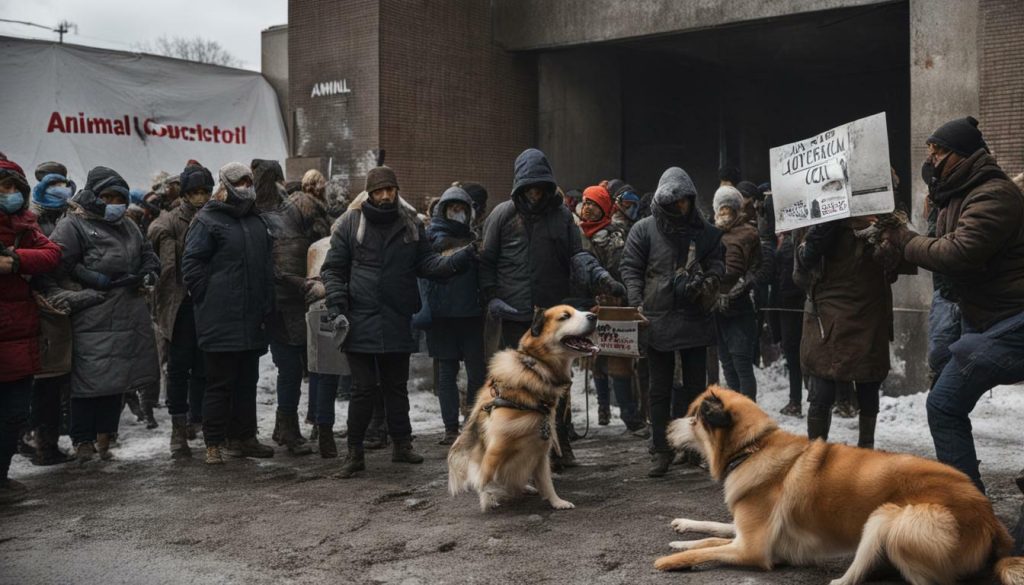
In addition, partnerships between law enforcement, educational institutions, and animal welfare organizations can facilitate the dissemination of information and resources on identifying and reporting animal cruelty. Public campaigns, workshops, and support networks should be established to empower individuals to take action, report suspicious activities, and create a safer environment for animals.
Enhancing Enforcement and Education Checklist:
- Implement targeted legislation and increase penalties for animal fighting offenses.
- Establish specialized task forces to investigate and prosecute dogfighting rings.
- Collaborate with local communities and animal welfare organizations to gather intelligence and support investigations.
- Create comprehensive educational programs to raise awareness about animal cruelty and responsible pet ownership.
- Partner with educational institutions and animal welfare organizations to promote information sharing and resource dissemination.
- Develop public campaigns, workshops, and support networks to empower individuals to report animal cruelty.
By focusing on strengthening enforcement efforts and promoting education, we can create a society that prioritizes animal welfare and leaves no room for the barbaric practices of dogfighting. Together, we can make a difference and ensure a future where animals are protected from cruelty and violence.
| References |
|---|
| 1. ASPCA. (n.d.). Combating Dogfighting. Retrieved November 1, 2022, from https://www.aspca.org/animal-cruelty/dogfighting |
| 2. Humane Society of the United States. (2022). Combatting Animal Fighting. Retrieved November 1, 2022, from https://www.humanesociety.org/resources/combatting-animal-fighting |
| 3. The Animal Legal Defense Fund. (n.d.). Animal Fighting. Retrieved November 1, 2022, from https://aldf.org/issue/animal-fighting/ |
FAQ
What are the charges against Frederick Douglass Moorefield and Mario D. Flythe?
Frederick Douglass Moorefield and Mario D. Flythe face charges of promoting and furthering animal fighting ventures.
What is the potential prison sentence if Frederick Douglass Moorefield and Mario D. Flythe are convicted?
If convicted, Frederick Douglass Moorefield and Mario D. Flythe could face up to five years in federal prison.
What evidence was found that implicates Frederick Douglass Moorefield in dogfighting activities?
Investigators discovered evidence such as battery jumper cables used to execute dogs, pit bull-type dogs at Moorefield’s house, weighted collars and heavy metal chains, and an apparatus for involuntarily inseminating female dogs.
How did Frederick Douglass Moorefield and Mario D. Flythe communicate about their dogfighting activities?
They communicated through an encrypted messaging app called Telegram, using code names for their operations.
How long has Frederick Douglass Moorefield been involved in dogfighting?
Frederick Douglass Moorefield has been involved in dogfighting since at least 2002.
What is the status of Frederick Douglass Moorefield’s employment at the Department of Defense?
The Department of Defense confirmed that Frederick Douglass Moorefield is no longer working at the Pentagon, but did not provide further details on his employment status.
What concerns have animal rights advocacy groups expressed?
Animal rights advocacy groups have expressed concern about the prevalence of animal fighting and the need for more enforcement against such activities.
Source Links
- https://www.fox5dc.com/news/us-defense-department-official-charged-in-facilitating-dog-fighting-ring
- https://thehill.com/policy/defense/4236582-senior-pentagon-official-charged-over-dog-fighting-ring/
- https://www.washingtonpost.com/dc-md-va/2023/10/02/moorefield-charged-dog-fighting-department-defense/
